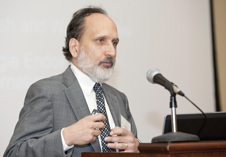As new markets rise, a call for ‘global consciousness’

Emerging markets, such as China, India and Brazil, are prone to suffer catastrophic financial crises within the next 40 years, according to William Shaw, a visiting scholar at the Carnegie Endowment for International Peace.
Speaking at the third annual symposium on emerging markets at Northeastern’s John D. O’Bryant African-American Institute on Thursday, Shaw told some 50 scholars and business leaders, “Emerging markets lack regulatory institutions and effective social safety nets” to prevent an economic collapse. “We have to anticipate large shocks to the global economy.”
Ravi Ramamurti, Distinguished Professor of International Business and director of Northeastern’s Center for Emerging Markets, organized the program, which was co-sponsored by AIM International Business Council and WorldBoston. The center is a clearinghouse for the latest ideas on the business opportunities springing up in developing international markets around the world.
Shaw based his presentation on his new book, “Juggernaut: How Emerging Markets are Reshaping Globalization.” The rise of emerging markets, he said, poses a series of difficult challenges on a worldwide scale.
A rapid increase in labor force participation in countries such as India, for example, will contribute to the widespread expansion and prosperity of emerging markets. But labor force growth will also precipitate a mass migration of more financially stable workers to countries like the United States, which, Shaw said, will face the burden of “keeping out illegal immigrants.”
The growth of emerging markets will also have a negative impact on the environment, Shaw said. By 2050 — when climate change experts predict the average global temperature will rise by some five degrees — developing nations will be the cause of roughly 50 percent of carbon emissions.
“It could be calamitous in terms of inadvertently affection millions of people,” Shaw said. “It’s a very serious dilemma.”
Problems linked to the fate of emerging markets, he said, must be solved by a core group of policymakers in global capitals of the world, from Beijing to Washington, D.C.
As Shaw put it, “Universal concessions tend to fail. Instead, we need to have an agreement among a critical mass of players and have other people come along.”
He had one wish for the salvation of the worldwide economy. “My hope for mankind is the birth of a global consciousness,” Shaw said. “Otherwise, we are in trouble.”





